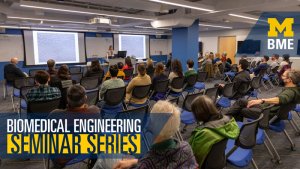Presented By: Biomedical Engineering
Biomedical Engineering Seminar Series
"The clock is ticking – why it’s time to engineer biorhythms in vitro," with Sasha Cai Lesher-Pérez, Ph.D.

The clock is ticking – why it’s time to engineer biorhythms in vitro
Abstract:
The mechanistic study of pathophysiology and therapeutic action has long relied upon the use of engineered in vitro cell culture systems. These systems, however, lack the periodic fluctuations, or biorhythms, in the cellular microenvironment that effectively integrate “time” into these culture platforms by providing physiological inputs necessary for cellular synchronization and circadian rhythms. Given the central role that circadian rhythms play in health and disease, this absence is puzzling. For example, cardiovascular disease, diabetes, osteoarthritis, and asthma, are just a few diseases with known circadian rhythm effects. Moreover, more than half of the top 100 selling drugs target the product of a circadian gene, and multiple clinical trials have retrospectively shown the impact of time-of-day dosing on improved outcomes and increased patient lifespan. The underlying reason conventional systems largely do not integrate temporal dynamics in vitro is because they either require the use of poorly scalable external flow control systems or manual fluid exchanges. In this talk, I will discuss my group’s research focusing on the development of microfluidic technologies to address the challenges of embedding time within scalable in vitro systems using microfluidic circuits. Additionally, I will describe microfluidic systems we have developed for the scalable production of microgels for use in packed bed reactors that allow us to perform rhythmic fluidic exchanges in 3D tissue cultures.
Abstract:
The mechanistic study of pathophysiology and therapeutic action has long relied upon the use of engineered in vitro cell culture systems. These systems, however, lack the periodic fluctuations, or biorhythms, in the cellular microenvironment that effectively integrate “time” into these culture platforms by providing physiological inputs necessary for cellular synchronization and circadian rhythms. Given the central role that circadian rhythms play in health and disease, this absence is puzzling. For example, cardiovascular disease, diabetes, osteoarthritis, and asthma, are just a few diseases with known circadian rhythm effects. Moreover, more than half of the top 100 selling drugs target the product of a circadian gene, and multiple clinical trials have retrospectively shown the impact of time-of-day dosing on improved outcomes and increased patient lifespan. The underlying reason conventional systems largely do not integrate temporal dynamics in vitro is because they either require the use of poorly scalable external flow control systems or manual fluid exchanges. In this talk, I will discuss my group’s research focusing on the development of microfluidic technologies to address the challenges of embedding time within scalable in vitro systems using microfluidic circuits. Additionally, I will describe microfluidic systems we have developed for the scalable production of microgels for use in packed bed reactors that allow us to perform rhythmic fluidic exchanges in 3D tissue cultures.